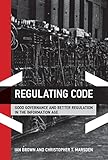Regulating code : good governance and better regulation in the information age / Ian Brown and Christopher T. Marsden.
Material type: TextLanguage: English Series: Information revolution and global politicsPublication details: Cambridge, Mass. : The MIT Press, c2013.Description: xix, 267 pages ; 24 cmISBN:
TextLanguage: English Series: Information revolution and global politicsPublication details: Cambridge, Mass. : The MIT Press, c2013.Description: xix, 267 pages ; 24 cmISBN: - 9780262018821
- 0262018829
- Computer networks -- Law and legislation
- Redes de información -- Legislación
- Programming languages (Electronic computers)
- Lenguajes de programación (ordenadores electrónicos)
- Internet -- Law and legislation
- Internet -- Legislación
- Information policy
- Sistemas de almacenamiento y recuperación de información -- Legislación
- 338.9/26
- K 564 B878r 2013
| Item type | Current library | Home library | Collection | Shelving location | Call number | Copy number | Status | Date due | Barcode |
|---|---|---|---|---|---|---|---|---|---|
 Libro
Libro
|
Biblioteca Juan Bosch | Biblioteca Juan Bosch | Ciencias Sociales | Ciencias Sociales (3er. Piso) | K 564 B878r 2013 (Browse shelf(Opens below)) | 1 | Available | 00000157484 |
Includes bibliographical references (p. [211]-256) and index.
Mapping the hard cases
Code constraints on regulation and competition
Privacy and data protection
Copyrights
Censors
Social networking services
Smart pipes : net neutrality and innovation
Comparative case study analysis
Holistic regulation of the interoperable Internet
"Internet use has become ubiquitous in the past two decades, but governments, legislators, and their regulatory agencies have struggled to keep up with the rapidly changing Internet technologies and uses. In this groundbreaking collaboration, regulatory lawyer Christopher Marsden and computer scientist Ian Brown analyze the regulatory shaping of 'code' - the technological environment of the Internet - to achieve more economically efficient and socially just regulation. They examine five 'hard cases' that illustrate the regulatory crisis: privacy and data protection; copyright and creativity incentives; censorship; social networks and user-generated content; and net neutrality. The authors describe the increasing 'multistakeholderization' of Internet governance, in which user groups argue for representation in the closed business-government dialogue, seeking to bring in both rights-based and technologically expert perspectives. Brown and Marsden draw out lessons for better future regulation from the regulatory and interoperability failures illustrated by the five cases. They conclude that governments, users, and better functioning markets need a smarter 'prosumer law' approach. Prosumer law would be designed to enhance the competitive production of public goods, including innovation, public safety, and fundamental democratic rights"--Unedited summary from book jacket


There are no comments on this title.